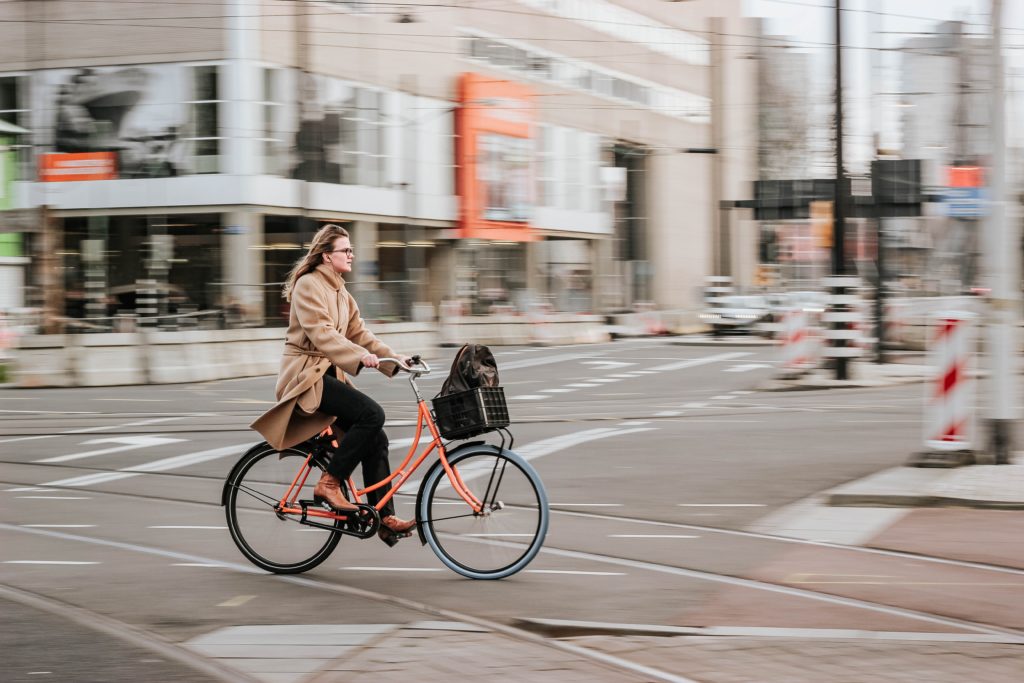Why is commuting important?
Light vehicles, including passenger cars, account for about a third of global oil demand and produce about half of all transportation-related greenhouse gas emissions (1).
Changing commuting behaviour is a key factor in sustainable mobility, with great potential to reduce greenhouse gas emissions and local air pollution. It can also significantly contribute to improving the quality of life for staff, saving time and money.
Organisations can drive change by setting ambitions, developing a corporate mobility plan and implementing policies that encourage and incentivise cleaner and healthier mobility choices.
Maintaining and institutionalising teleworking is critical to reducing emissions, building upon the Covid-19 experience. Green commuting includes public transport, soft mobility (cycling, walking), carpooling or carsharing, efficient driving and switching to electric cars.

Key solutions
#1 Teleworking
Reducing travel is the fastest and most effective way to reduce emissions for all staff. Remote work is key.
An organisation can :
- Allow and encourage staff to work from home or close by
- Go beyond the minimum number of days of telework per week required or recommended by the authorities
- Pay home internet bills, coworking space memberships and cell phone bills
- Provide good videoconferencing tools and train staff in their use.
#2 Soft mobility
Cycling and walking to work are powerful ways to reduce emissions.
An organisation can :
- Install covered and secured bicycle parking
- Provide changing rooms and showers
- Cover part of the cost of (e) bikes
- Join or organise events such as a Bike to Work or a Bike Repair Day
- Provide bikes for local business travels
- Encourage the municipality to install bike-friendly infrastructure (paths, parking, bike-friendly trains)
#3 Public transport
If your workplace is served by public transport, commuting by bus, train or boat can be an excellent sustainable transport solution.
An organisation can :
-
- Offer a public transport rebate (e.g. reimburse 50%)
- Guarantee ride home in the case of an unexpected event (up to 5x per year)
- Choose premises close to public transport
- Adapt working hours to the arrival times of trains
#4 Car use reduction & optimisation
Where car travel is unavoidable, there are ways to reduce the number of cars used and their carbon footprint, including carpooling, carsharing, eco-driving and alternative fuels.
An organisation can :
-
- Set up an internal carpooling system
- Pay for part of the subscription to a carpooling or carsharing application
- Reserve parking for carpoolers and carsharers, not guarantee parking for others, apply an SUV-free parking policy, charge for the use of the parking
- Offer eco-driving training to its staff
- Incentivise the use of alternative fuels (eg. by subsidising or informing about bioethanol conversion kits for cars)
- Facilitate the use of electric vehicles (e.g. by installing charging stations)
Tools and best practices
-
6 Key Benefits from Ride Sharing, WREC
This infographic highlights six key benefits of ride-sharing.
Explore it here - Playing my part report, solutions, facts and figures, IEA
- How to green your commute? Solutions and tips, David Suzuki Foundation
- Bike-to-Work Day: How to engage your employees?
Sources
(1) Light vehicles, The ICCT, 2021. Read here.
(2) Around 1/3 of car journeys in the European Union are less than 3 km. Read here.
(3) Cars are parked 23 hours a day in England. Read here.
(4) 271 kg CO2e less per year per day of remote working. Read here.
(5) Plans de mobilité guide à l’attention des entreprises et institutions, Canton de Vaud, 2021. Read here.
(6) Plans de mobilité guide à l’attention des entreprises et institutions, Canton de Vaud, 2021. Read here.
(7) Klaxit. See here.
(8) La Poste Solutions. Read here.
Cover photo © Marcelo Cidrack/Unsplash.
Teleworking

Soft mobility

Public transport

Car use rationalisation

Soft mobility

Public transport

Car use rationalisation

Teleworking

